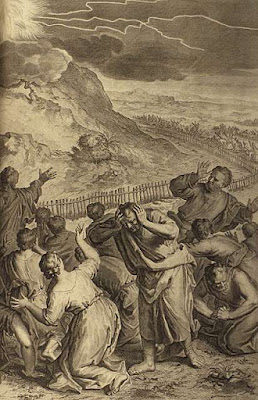Jehovah El Qanna means the Lord (Jehovah) is a jealous God
(El Qanna). In today’s vernacular, the word jealous conjures negative
connotations of envious behavior toward someone because of their advantages, achievements,
or belongings, but what does it mean that God is a jealous God?
To better understand, what it means for God to be jealous, let’s look at Exodus 32 where the Israelites crafted a golden calf idol and credited it for bringing them out of Egypt. This happened while Moses was on Mount Sinai receiving the commandments. When the people came to Aaron with their ideas, he told them to “Tear off the gold rings which are in the ears of your wives, your sons, and your daughters, and bring them to me.” From these, he fashioned a molten calf and the people said, “This is your God, O Israel, who brought you up from the land of Egypt.”
Before Moses went up on the mountain the people agreed to DO whatever God said (Exodus 24:3). God sent Moses down to the people with the stone tablets and he found them partying and celebrating their new god. Moses threw the tablets to the ground. After dealing with the people, God told Moses to make two new stone tablets and come back up the mountain, where He re-established His covenant with the people through His law. During this interaction, God made it clear He will not share His glory with other gods or anything else. It was at this time that Jehovah introduced Himself as Jehovah El Qanna.
What does the Lord is a Jealous God mean?
To understand the name El Qanna, it helps to put things into context. The fundamental meaning of the word Qanna (jealous) relates to a marriage relationship. Remember than in the Old Testament, God is depicted as Israel's husband. When Israel worshipped other gods, it is adultery. In Jeremiah 3, the Lord spoke to Josiah the king about what faithless Israel did. She went up to the high places and was a “harlot” there. And Judah followed with the same sin of adultery. Then God invited them to repent (to change their minds, their way of thinking).
“Go and proclaim these words toward the north and say,
'Return, faithless Israel,’ declares the LORD;
‘I will not look upon you in anger.
For I am gracious,’ declares the LORD;
‘I will not be angry forever.
‘Only acknowledge your iniquity,
That you have transgressed against the LORD your God
And have scattered your favors to the strangers under every green tree,
And you have not obeyed My voice,’ declares the LORD.
‘Return, O faithless sons,’ declares the LORD; […]
And I will bring you to Zion.’
“Then I will give you shepherds after My own heart, who will feed you on knowledge and understanding. ~ (Jeremiah 3:11-15) (Emphasis mine.)
God desires an intimate relationship with his wife, Israel, but because of her unfaithfulness he gave her a “writ of divorce” Jer. 3:8. In the New Testament, the church is his bride, but the only way to become his bride is by grace through faith (Eph. 2:8-9). In Matthew 7:21-23 Jesus says, “Not everyone who says to Me, ‘Lord, Lord,’ will enter the kingdom of heaven, but he who does the will of My Father who is in heaven will enter. Many will say to Me on that day, ‘Lord, Lord, did we not prophesy in Your name, and in Your name cast out demons, and in Your name perform many miracles?’ And then I will declare to them, ‘I never knew you; depart from Me, you who practice lawlessness.’”
In this verse, the word “knew” is referring to that intimate relationship between a husband and wife. When you come to Him in faith, you receive the Holy Spirit. He resides inside you. He “knows” you.
Jehovah is a jealous God. It is his desire that our faith is placed in Him. When Abraham placed his faith in God, it was reckoned to him as righteousness. That was before the Law. When the Law came along, the first half of the ten commandments dealt with our relationship to God. “You shall have no other gods before Me.
“You shall not make for yourself an idol, or any likeness of what is in heaven above or on the earth beneath or in the water under the earth. You shall not worship them or serve them; for I, the Lord your God, am a jealous God, visiting the iniquity of the fathers on the children, on the third and the fourth generations of those who hate Me, but showing lovingkindness to thousands, to those who love Me and keep My commandments.” This reminds me of Jesus saying, “If you love me, keep my commandments” (John 14:15).
It's easy to look at Scripture and see where people went off course to serve a god other than Jehovah El Qanna. The question that we need to ask ourselves is when people look at our lives, who do they see us serving?
As I prayed this morning, I thought of the AI Jesus in the news. and how people are flocking to it with questions. It is an idol. In fact, as I searched for images for this blog post, I ran into chat Jesus and it said, “I am Jesus the Son of God” and asked how it may be of service. On top of that, we they are crafting an AI Bible. What do you think God thinks of that? We don’t need to speculate since his Word says “you shall not worship any other god, for the Lord, whose name is Jealous, is a jealous God” (Exodus 34:14).
“I am the Lord, that is My name;
I will not give My glory to another,
Nor My praise to graven images (Is. 428)










